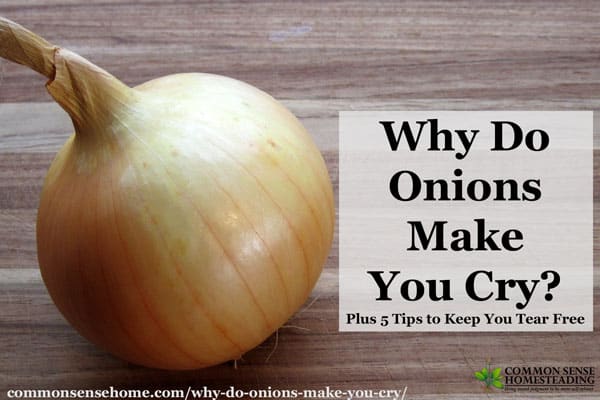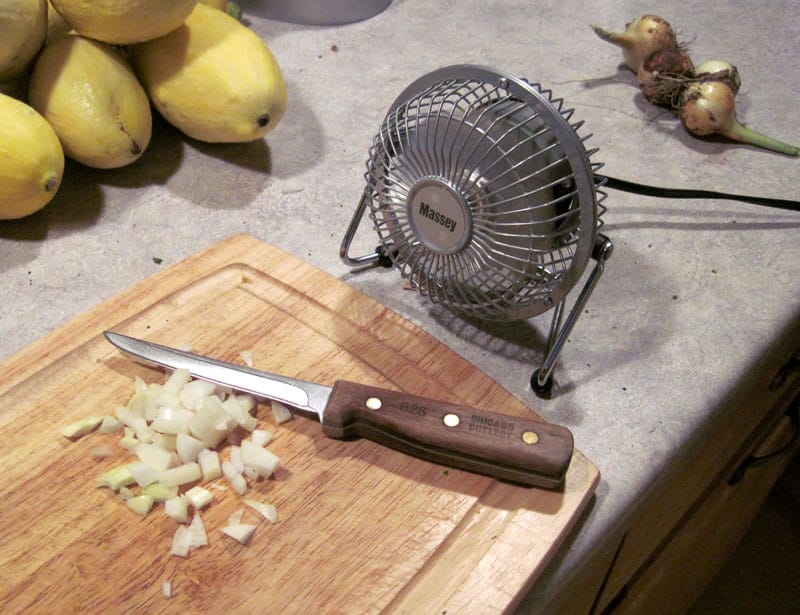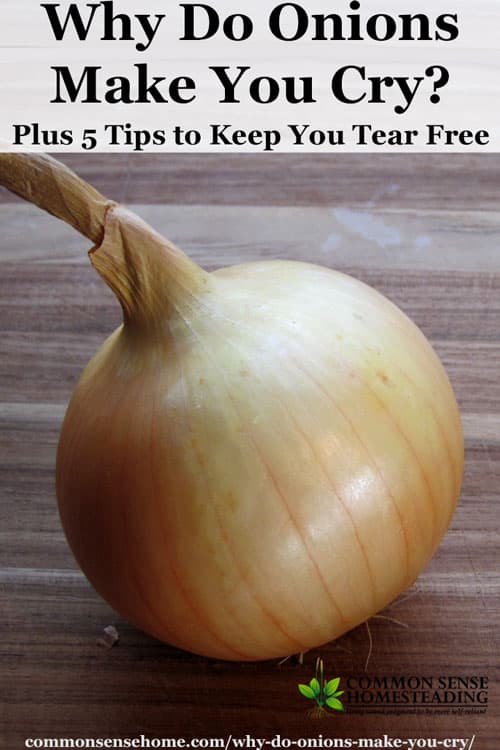Why Do Onions Make You Cry? Plus 5 Tips to Keep You Tear Free
This post may contain affiliate links. Read my full disclosure here.

Why do onions make you cry, and what can you do about it? My brother told me about the simple trick he uses to process large batches of eye-burning onions without shedding a tear. In case you don’t have the “trick” item on hand, I have other options that work pretty well to help you avoid “onion eyes”.
Why do Onions Make You Cry?
Short answer: Onions make you cry because they release a sulfenic acid in gaseous form. Yup – acidic gas. Tears are our bodies natural protection.
Science Focus gives more details:
The onion’s cells contain an enzyme called alliinase and chemical compounds called sulfoxides. Normally the alliinase and sulfoxides are kept apart, but when the onion is chopped, they are released and react to form sulfenic acid.
This acid is then acted on by a second type of enzyme called a synthase, which produces a gas called ‘syn-propanethial-S-oxide’. This diffuses through the air and irritates your eyes, prompting your tear glands to produce tears to flush it out.
Intrigueology has a pretty cool video on all the gory details. 🙂 Most bacteria don’t grow in acidic environments, either. (See below.)
Are cut onions dangerous? Do cut onions trap cold germs?
There’s a meme that keeps circulating on social media that just won’t go away that says cut onions are dangerous. The latest version I saw read as follows:
DANGEROUS – SHARE WITH EVERYONE
Please remember it is dangerous to cut an onion and try to use it to cook the next day, it becomes highly poisonous for even a single night and creates toxic bacteria which may cause adverse stomach infections because of excess bile secretions and even food poisoning.
Another twist on this says that cut onions will attract cold and flu germs and keep illness away.
Both of these are pure bumpkis, false, fake, BS, tripe, garbage – you get the idea.
Cut onions are safe to eat the next day if properly stored. Cut onions do not ward off cold and flu germs when left out on a household surface. (If you use them in something like thieves vinegar, that would be more effective.) The same acid that makes your eyes burn does help to inhibit bacteria growth, but only directly on the onion. (Remember how it’s safe to water bath can foods that are acidic, because the acid help prevent spoilage?)
If cut onions were poisonous, restaurants wouldn’t be able to batch prep large amounts of chopped onions and use them for several days. My friend, Julie, used to chop up 50 pounds of onions at one time when she worked in a sub shop back in college. They went through a lot of onions, but not 50 pounds in one day. The National Onion Association says that chopped onions are good for up to 7 days if stored in a sealed container in the refrigerator.
What are the Health Benefits of Onions?
The World’s Healthiest Foods details the health benefits of onions, including:
- protecting the heart
- supporting bone and connective tissue
- acting as an anti-inflammatory
- protecting from cancer
You get the most benefits when the onions are raw, but gentle cooking preserves some of them, too. Just don’t turn your onions into charcoal.
Don’t Cry Over Cut Onions – 4 Tips to Avoid Onion Eyes
#1 – My all time favorite technique (which was suggested by my brother) that I now use regularly for processing large batches of onions (for instance, when I’m canning salsa), is to put a small fan on the counter next to where I’m chopping. Use the fan to blow away the sulfenic acid gas and keep it out of your eyes – no tears.

Would you like to save this?
I’ve got a little Massey personal fan that we received as a hand me down from my in-laws. A larger fan would work, too – the small ones are just more convenient (and pretty inexpensive).
Now, if you don’t have a fan handy, there are some other options you can use to avoid crying while slicing or chopping onions:
#2 – Chill your onions in the fridge or freezer or by running them under cold water
Chilling reduces the oxidation rate, meaning they produce less of those irritating compounds. Also, hot air and hot gas (including sulfenic acid laden gas) rises faster than cold gas, and cold tends to be less irritating than hot. The water will dilute the juices so less of them get airborne.
#3 – Wear goggles to block the onion fumes
This will keep fumes out of your eyes, but unless you’ve got sealed goggles, you’re still still going to get it. Plain safety glasses won’t cut it. I don’t like the really flimsy ones, either. A couple extra bucks will get you ones that are fog and impact resistant for other tasks.
#4 – Cut Your Onions with a Very Sharp Knife
One of our readers (Kevin) shared a tip from culinary school:
During my attendance at Culinary School many years ago, the simple trick taught to prevent the onion cry, is to use a very sharp knife. I can chop dozens of room temp or chilled onions in my tiny apartment kitchen and not shed a tear, if I use a sharp chef’s or paring knife…
Another reader, Sherry, agrees:
A few years ago I got a SUPER good chef’s knife. (Shun) It greatly reduced the amount of tears when I chop onions because it’s so sharp it doesn’t break as many of the cells. Not to mention how much less effort it takes to cut stuff up!
#5 – Chew gum to breath fewer onion fumes
If for some reason you are really desperate, don’t have a fan, or refrigeration, or water or goggles, yes, chewing gum does help – a little. It works because you tend to breathe through your mouth more, so you suck less gas into your nose/sinuses. Feeble relief at best, but it might distract you enough to make you less miserable.
If you’ve enjoyed this post, Like it, Pin it, Stumble it, Share it. Help end needless onion pain. 😉

You may also enjoy:
- 35+ Handy Kitchen Substitutions – Printable List
- How to Harvest, Cure and Store Onions – Root Cellaring, Braiding, Dehydrating and Freezing
- How to Get Rid of Ants Naturally
Originally posted in 2015, updated in 2017.

I don’t know why it works, but I was told not to chop onions with warm hands, so before chopping, I rinse my hands in cold water, and there are no tears, even if I forget and start chopping and start tearing up, I just stop and rinse my hands in cold water and it stops right away.
Fantastic! I’ll have to try these. Onions always make me cry.
Here are a few tips I have applied. I light up a candle on the side while cutting onions. Or the quickest way to cure my crying over the onion is putting face in front of the freezer, the cold air will work right away to sooth my eyes.
While cutting onions never inhale or exhale through your nose. Works for me. Thanks for your posts
Thanks for sharing your tip, Diana. The tear ducts in the eye are connected directly to the nose, so I could see where that might indeed help.
I agree with the others above that having a super sharp knife greatly reduces the tear-factor. I read the science about it somewhere, and it was as Sherry said – a blunt knife squashes more cells as it cuts, releasing more gas. A sharp knife slices cleanly through, minimising the number of cells releasing gas.
Journey11’s tip helps, too – because they leave the base on until the end, there’s less cut surface area exposed to the air and so less gas given off. Also, when they cut through the middle and lay it flat, they’re stopping that surface from releasing gas too.
I think my readers are better informed than most of the “expert” opinions I’ve read out there. Thanks much to everyone who has shared your experience. Keep ’em coming!
Thanks to everyone for sharing additional ideas!
I also found I am less likely to shed tears if I leave the root end attached until the last chop. (Half the onion, lay the flat side down, then cut out in rays like a sun or make slices.) I think the gasses must be more highly concentrated in the root.
Burning a candle in your work area is pretty affective.
You could use swim goggles, those would be sealed off. That would be so funny to walk into the kitchen and see that! When I used to cut tons of onions for the dairy bar chili just turning on the cold water would do the trick. Or I would get all the onions in a huge stock pot and dump a bunch of ice on them. I would only pull one from the ice as I cut them.
I think I saw the swim goggles thing on Castle – brilliant idea. 😀
Nice! Thanks for the tip!
Here’s another trick: Hold several wooden matches in your mouth as you
cut onions. (No, don’t light the matches. That definitely would distract you from the onion tears, but might lead to other complications.) Maybe the
match heads absorb some of the gas?
I’m surprised that Maureen finds the goggles work well. I was told by someone many years ago that it’s not the fumes going into your eyes, it’s when you breathe them in. I tested their theory and found that if I take a big breath (from a different direction to the onions) and hold it in while I cut, and then slowly exhaling, it helps. I then take another big breath (away from the onions) and keep going.I don’t need to cover my eyes at all. This worked, but isn’t beneficial if you’re cutting many onions at once. (Light-headed after a little while.) I think this is also why the fan works so well. It’s because it’s blowing the fumes away from your nose and you’re not breathing them in.
During my attendance at Culinary School many years ago, the simple trick taught to prevent the onion cry, is to use a very sharp knife. I can chop dozens of room temp or chilled onions in my tiny apartment kitchen and not shed a tear, if I use a sharp chef’s or paring knife… no fan, no gum, no goggles…
a few years ago I got a SUPER good chef’s knife. (Shun) It greatly reduced the amount of tears when I chop onions because it’s so sharp it doesn’t break as many of the cells. Not to mention how much less effort it takes to cut stuff up!
Thanks for the link to the goggles. I purchased a pair of ‘onion goggles’ on Amazon last year and absolutely LOVE them (they are the ONLY thing that has worked for me, and I’ve tried them all). Thankfully, the ones you posted are half the price and now I can get another pair for my daughter.